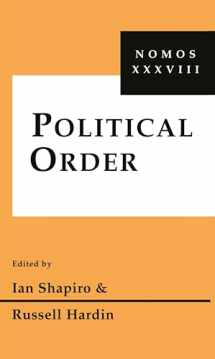
Political Order: Nomos XXXVIII (NOMOS - American Society for Political and Legal Philosophy, 18)
ISBN-13:
9780814781036
ISBN-10:
0814781039
Author:
Ian Shapiro, Russell Hardin
Publication date:
1998
Publisher:
NYU Press
Format:
Paperback
548 pages
FREE US shipping
Book details
ISBN-13:
9780814781036
ISBN-10:
0814781039
Author:
Ian Shapiro, Russell Hardin
Publication date:
1998
Publisher:
NYU Press
Format:
Paperback
548 pages
Summary
Political Order: Nomos XXXVIII (NOMOS - American Society for Political and Legal Philosophy, 18) (ISBN-13: 9780814781036 and ISBN-10: 0814781039), written by authors
Ian Shapiro, Russell Hardin, was published by NYU Press in 1998.
With an overall rating of 3.6 stars, it's a notable title among other
books. You can easily purchase or rent Political Order: Nomos XXXVIII (NOMOS - American Society for Political and Legal Philosophy, 18) (Paperback) from BooksRun,
along with many other new and used
books
and textbooks.
And, if you're looking to sell your copy, our current buyback offer is $0.3.
Description
The collapse of the Soviet empire stands as a dramatic reminder that political institutions are human creations that can be designed more or less well. The question of what constitutes a viable political order is as old as it is profound, and is a central part of the works of such thinkers as Plato, Aristotle, Machiavelli, Hobbes, Locke, Montesquieu, and the American Founders. In eighteen original essays, Political Order presents the work of major scholars such as Robert Dahl, John Gray, Jennifer Nedelsky, Pasquale Pasquino, James Scott, Karen Orren, Steven Skowronek, Walter Dean Burnham, Morris Fiorina, and Norman Schofield who address some of the most pressing questions about political order. Under what conditions do we get political order rather than political chaos? How is political order sustained once it has been created? Do constitutions and electoral systems matter, and if so how much? Is there one best type of political order, and, if not, what is the range of viable possibilities and how should they be evaluated?


We would LOVE it if you could help us and other readers by reviewing the book
Book review

Congratulations! We have received your book review.
{user}
{createdAt}
by {truncated_author}


